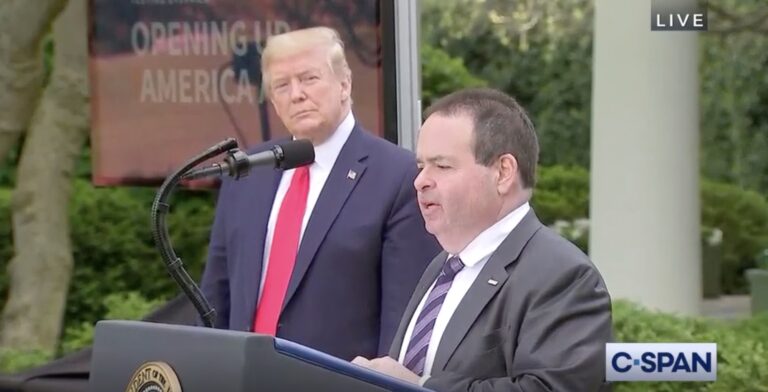Trump Takeover of CFPB: Capitalism Cannot Be Saved From Itself
A decade ago, around this time of year, much of the world was strapped into their seats as they watched the unfolding of the worst global economic crisis since the Great Depression. Ask anyone who has watched “The Big Short” to explain the financial crisis in a minute or less, and they will readily identify predatory lending as the chief culprit. Abetted by dishonest credit rating agencies, fraudulent mortgage brokers and lenders, earning fat commissions from making unpayable loans to unwitting borrowers, repackaged these risky subprime mortgages into securities. Then, these securities were bought by Wall Street banks who trusted the government to bail them out in case of bankruptcy because they were “too big to fail.” This pattern of insidious behavior by the most important financial institutions in the United States is not a one-off instance of poor decision-making. It is symptomatic of the structural disease that allows the American capitalist to seize more of what they want: profits.
Responding to these immediate causes of the crisis and popular agitation for reform, Congress (then controlled by the Democrats) passed the Dodd-Frank Act, implementing a series of financial reforms designed to improve financial stability through regulation. One such reform established the Consumer Financial Protection Bureau (CFPB), a new agency tasked with protecting consumers from financial malpractices like the predatory lending which contributed to the 2008 crisis.
From the outset, Republicans have been vehemently opposed to the Dodd-Frank Act and the CFPB, striving to undermine or dismantle them at every opportunity. So it is perhaps no surprise that when the Obama-nominated CFPB Director Richard Cordray resigned last November, a contentious legal dispute erupted over the rightful successor. Upon resignation, Cordray cited provisions from the Dodd-Frank Act to name Deputy Director Leandra English as the new director. However, Trump refused to appoint English and instead cited the Federal Vacancies Reform Act to appoint Mick Mulvaney as acting director. Backed by Senator Elizabeth Warren, Dodd-Frank co-author Barney Frank (a Democratic Representative from Massachusetts) and others, English has mounted two legal challenges to Mulvaney’s appointment, though both were denied by a Trump-appointed district judge.
While the legal battle is still ongoing, Mulvaney, a known detractor of the CFPB, has wasted no time in implementing a program of sabotage, drastically reducing CFPB’s regulatory authority and responsibilities. Under his leadership, the CFPB has softened settlement negotiations with Wells Fargo for alleged mortgage lending abuse; dropped lawsuits and investigations into unscrupulous payday lenders, including one loan shark charging 950 percent interest rates; halted a rule preventing such practices, delighting an industry that has donated $57,000 to Mulvaney’s political campaigns; and requested $0 from the Federal Reserve for the CFPB’s quarterly budget, compared to the $271.1 million requested by Cordray last quarter.
Though the CFPB leadership struggle and Mulvaney’s subsequent sabotage of the agency has been widely reported, there has been scant analysis of the developments in the larger context of the economy and American capitalism—a typical analysis for mainstream media. Ironically, in an interview, Mulvaney himself provided a comment that may provide an insight into the wider implications of his sabotage program: “We’re gonna try and limit, as much as we can, what the CFPB does to sort of interfere with capitalism and with financial service markets.”
Indeed, Mulvaney’s sabotage program is the cavalry charge that American capitalists have been waiting for; this charge aids their project in systematically eradicating any effective democratic resistance to their hegemony. It diminishes an already weak policy reaction to the 2008 Financial Crisis, for which Wall Street went largely unpunished. The “big banks,” recipients of the taxpayer-funded bailout, remain too big to fail. Only one Wall Street executive has been jailed.
Emboldened by a government response that is ceremonial at best and regressive at worst, the unpunished culprits of the financial crisis have pursued their greed with unprecedented fervor. According to a recent report from the New York Federal Reserve, U.S. household debt has skyrocketed to a record-breaking $13 trillion, far surpassing the previous peak reached in 2008 and marking the fifth consecutive year of growth in annual household debt. Notably, mortgages saw the largest increase in several quarters. With inflation-adjusted wages largely stagnant and income inequality rising since the 1970s, average Americans are increasingly resorting to borrowing (with increasingly risky loans at that) to satisfy their unabated appetite for material consumption, driven to neurotic levels in part by the U.S. advertising industry, which is by far the largest in the world and made up 19 percent of the entire country’s economic output in 2014. In the face of such an absurd amount of debt, Mulvaney’s sabotage of the CFPB will diminish the already scarce and badly-needed sources of information about the dangers of U.S. household debt.
But that’s not all. The most disturbing news comes from the market for subprime auto loans, where risky loans to car buyers are repackaged into securities for sale to banks in the same way as those subprime mortgage loans that collapsed the housing market in 2007. In the third quarter of 2017, 24 percent of all auto loans were granted to borrowers with subprime credit scores, while 9.7 percent of subprime loans made by non-bank lenders were 90 or more days overdue, the highest annualized rate in over seven years. With dubious lending practices on the rise and outright fraud already approaching levels seen in mortgages during the housing bubble preceding the financial crisis, Mulvaney’s gutting of the CFPB’s regulatory apparatus will only fuel the fire.
This is not meant to be fearmongering. The market for securities backed by subprime auto loans is still much smaller than that of securities backed by subprime mortgages before and during the last financial crisis. Though 2017 had the highest volume of auto loan originations, this number decreased slightly in the fourth quarter.
The increasingly risky conditions in the market for subprime auto loans is not an isolated phenomenon. It is the newest symptom of a fundamentally broken and self-destructive economic system. Despite rising rates of default and fraud in subprime auto loans, the supply of securities repackaged from them has amounted to $3 billion so far in 2018, almost double of that sold in the same period last year. Earlier this year, the two largest subprime auto lenders in the United States announced that both were suffering unexpectedly high rates of defaults, yet subprime loans are still the fastest growing part of all auto loans. How can that be? How is it possible that, with millions still struggling to recover from the last financial crisis, a saboteur who once called the CFPB a “sick, sad joke” could be appointed to head the same agency? Isn’t there something intuitively very wrong about appointing a captain who is not only determined to sail our ship into the iceberg, but is also enthusiastically poking holes in the ship’s hull?
Capitalism is an unstable system ridden with inconsistencies, all of which stem from one fundamental contradiction: the promise that social interest can be achieved by maximizing individual profit. Time and again, capitalism has fallen short of that promise. Yet it has proven extraordinarily capable of repeatedly shooting itself in the foot and still continuing to walk. How much longer can the body tolerate a pathogen before it rejects the virus or is destroyed by it?
Joy Ming King is a member of the Class of 2020. Joy Ming can be reached at jking01@wesleyan.edu.








CFPB ‘asked’ for public comments but when the public is IGNORED AND CFPB is disdainful of our input then why do they ask other than to fulfill a mandate from CONGRESS. Many feel why bother since the only input considered is from DONORs to Mulvaney, He is a known detractor of the CFPB, Mulvaney has wasted no time in implementing a program of sabotage, drastically reducing CFPB’s regulatory authority and responsibilities. Thereby endangering the public AGAIN. Not following up on criminally usurious interest on payday loans. The near collapse of the ENTIRE US financial industry in 2007-2008 resulted in destruction of many of the most prestigious Wall Street firms. Dodd-Frank Act was passed to protect the public with the assistance of the CFPB. Now the CFPB is in peril of destruction from within.